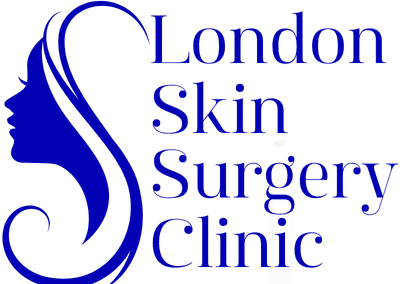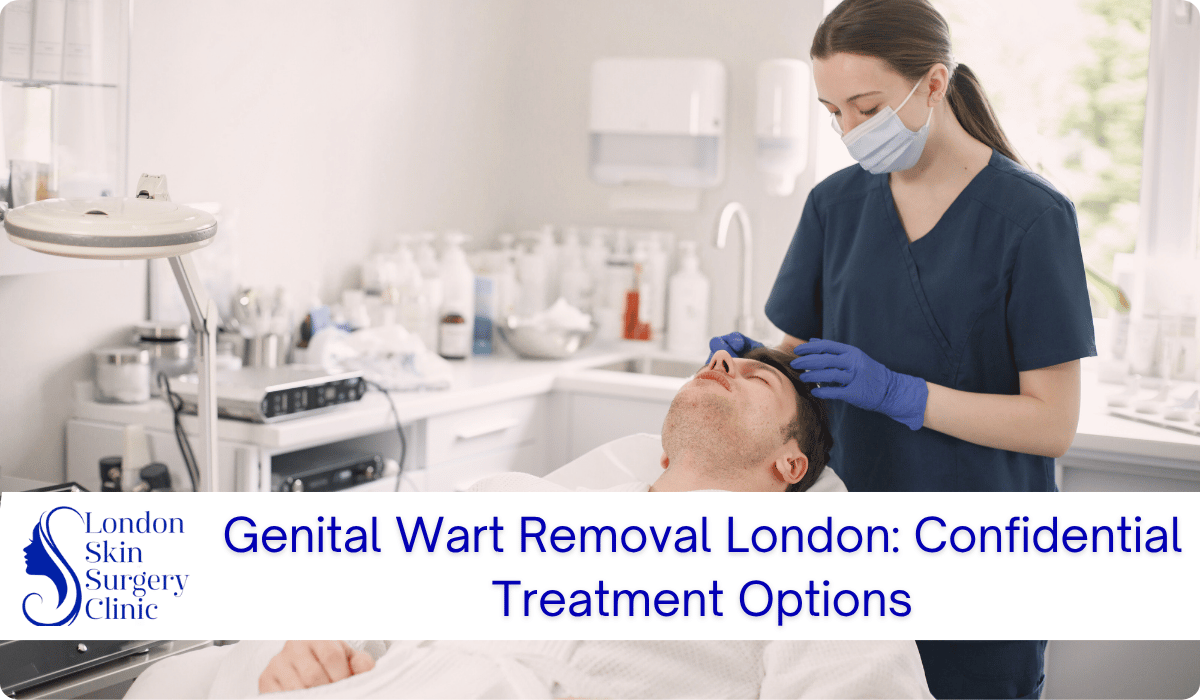Key Takeaways: Genital Wart Removal in London
Professional diagnosis is essential – Genital warts require expert assessment to distinguish them from other conditions and determine the most appropriate treatment approach.
Multiple treatment options are available – From cryotherapy and laser treatment to topical medications, treatment is tailored to the size, location, and number of warts.
Discomfort is manageable – While some sensation is inevitable, local anesthetics and pain management strategies ensure most patients experience minimal discomfort during treatment.
Proper aftercare speeds recovery – Following post-treatment guidelines helps prevent complications and promotes optimal healing.
Long-term management prevents recurrence – Since HPV may remain dormant, ongoing strategies including immune support, safe sex practices, and regular monitoring are essential for preventing new warts.
Table of Contents
- Understanding Genital Warts: Causes and Symptoms
- Why Professional Removal is Essential for Genital Warts
- Treatment Methods for Genital Wart Removal in London
- What to Expect During Your Confidential Consultation
- Recovery and Aftercare Following Genital Wart Treatment
- Is Genital Wart Removal Painful? Pain Management Options
- Cost of Genital Wart Removal at London Private Clinics
- Preventing Recurrence: Long-term HPV Management
Understanding Genital Warts: Causes and Symptoms
Genital warts are a common sexually transmitted infection (STI) caused by certain strains of the human papillomavirus (HPV). In London, our specialist clinic provides confidential genital wart removal services for patients seeking discreet treatment options. These small, flesh-coloured or greyish growths typically appear in the genital and anal regions, causing both physical discomfort and emotional distress.
The primary cause of genital warts is direct skin-to-skin contact during sexual activity with someone who carries the virus. It’s important to understand that HPV can be transmitted even when no visible warts are present, and symptoms may appear weeks or months after initial exposure. Common symptoms include:
- Small, raised bumps in the genital area
- Clusters of warts that may resemble cauliflower
- Itching or discomfort in the affected area
- Occasional bleeding during intercourse
While some genital warts may resolve without intervention, professional treatment is often recommended to reduce symptoms, prevent spread, and address aesthetic concerns. Our London-based genital wart specialists provide comprehensive assessment and personalised treatment plans in a confidential environment.
Why Professional Removal is Essential for Genital Warts
Seeking professional genital wart removal in London is crucial for several important reasons. While over-the-counter treatments exist for common warts, these are not suitable for the sensitive genital area and can potentially cause harm. Our private genital wart clinic offers medically-sound approaches that prioritise both effectiveness and patient comfort.
Professional removal ensures accurate diagnosis, as other conditions can mimic the appearance of genital warts. Our specialists can distinguish between genital warts and conditions such as molluscum contagiosum, sebaceous cysts, or skin tags, preventing inappropriate treatment. Additionally, some warts may require pathological examination to rule out more serious conditions.
The genital region’s sensitive nature demands expertise that only trained professionals can provide. Our London clinic’s practitioners understand the anatomical considerations necessary for safe treatment, minimising the risk of scarring or damage to healthy tissue. Professional removal also significantly reduces the risk of recurrence through complete elimination of visible warts.
Furthermore, a professional consultation provides an opportunity to discuss HPV vaccination, partner notification, and preventative measures—essential components of comprehensive sexual health care that aren’t available with self-treatment approaches. At our discreet dermatology service in London, we provide holistic care that addresses both the physical and psychological aspects of genital wart treatment.
Treatment Methods for Genital Wart Removal in London
Our London clinic offers various advanced treatment options for genital wart removal, tailored to each patient’s specific needs. The selection of the most appropriate method depends on factors including the size, location, and number of warts, as well as patient preferences and medical history.
Cryotherapy for genital warts involves freezing the affected tissue with liquid nitrogen. This precise technique causes the wart to blister and eventually fall off. Typically requiring multiple sessions spaced 1-2 weeks apart, cryotherapy is particularly effective for smaller warts and leaves minimal scarring.
Laser treatment for HPV utilises focused light energy to precisely remove wart tissue while minimising damage to surrounding healthy skin. This advanced option is ideal for extensive or persistent warts and offers excellent cosmetic results. Our London clinic employs state-of-the-art laser technology for optimal outcomes.
Electrocautery wart removal uses electrical current to burn away wart tissue. Performed under local anaesthetic, this method is effective for larger or clustered warts. The procedure seals blood vessels during treatment, reducing bleeding and promoting faster healing.
Topical treatments may be prescribed for home application between clinic visits. These include:
- TCA treatment (trichloroacetic acid) – applied directly to warts to destroy affected tissue
- Podophyllin therapy – a plant-based resin that disrupts wart cell division
- Imiquimod treatment – stimulates the immune system to fight HPV infection
For extensive cases, surgical excision may be recommended. This involves cutting away the wart tissue under local anaesthetic, providing immediate results for larger warts. Our genital wart removal specialists in London will discuss all available options during your consultation.
What to Expect During Your Confidential Consultation
At our private genital wart clinic in London, we understand the sensitive nature of seeking treatment for intimate health concerns. Your initial consultation is conducted with the utmost discretion and professionalism in a comfortable, private setting. Our sexual health specialists prioritise creating an environment where patients feel secure discussing their symptoms without judgment.
During your consultation, our specialist will begin with a detailed discussion about your medical history, including any previous STI diagnoses, treatments attempted, and the duration of your symptoms. This information helps tailor the most appropriate treatment plan for your specific situation. You’ll have the opportunity to ask questions and express any concerns about the treatment process.
A physical examination will be necessary to accurately diagnose genital warts and assess their extent. This examination is conducted respectfully, with clear communication throughout. Our practitioners are experienced in making this process as comfortable as possible, explaining each step before proceeding.
Following diagnosis, your specialist will outline all suitable treatment options, discussing the benefits, limitations, and expected outcomes of each approach. This comprehensive consultation ensures you have all the information needed to make an informed decision about your treatment. We never rush this process, allowing adequate time to address all your questions and concerns.
Our confidential service extends to all aspects of your care, including discreet appointment scheduling and private billing options. All patient information is handled in strict accordance with data protection regulations, ensuring your privacy is maintained throughout your treatment journey at our London clinic.
Recovery and Aftercare Following Genital Wart Treatment
Proper aftercare is essential for optimal healing and comfort following genital wart removal in London. Recovery experiences vary depending on the treatment method used, the extent of the warts, and individual healing factors. Our clinic provides comprehensive aftercare guidance tailored to your specific procedure.
Immediately after treatment, you may experience mild discomfort, redness, or swelling in the treated area. These symptoms typically subside within a few days. For cryotherapy or topical treatments, you might notice blistering or shedding of the treated tissue as part of the normal healing process. Surgical or laser treatments may require more specific wound care.
To support healing and prevent complications, we recommend:
- Keeping the treated area clean and dry
- Wearing loose, cotton underwear to reduce friction
- Avoiding sexual activity until healing is complete (typically 1-3 weeks)
- Refraining from swimming, hot tubs, or baths until the area has healed
- Using mild, fragrance-free soap for washing
Pain management typically involves over-the-counter analgesics such as paracetamol. For more extensive treatments, we may prescribe appropriate pain relief. Sitz baths (sitting in warm, shallow water) can provide comfort and promote healing for treatments in the anal area.
Follow-up appointments are scheduled to monitor your healing progress and assess the need for any additional treatments. Complete clearance sometimes requires multiple sessions, particularly for extensive warts. Our London clinic remains available for any concerns during your recovery period, with clear guidance on when to seek additional medical attention.
Is Genital Wart Removal Painful? Pain Management Options
A common concern among patients seeking genital wart removal in London is the level of discomfort associated with treatment. While some degree of sensation is inevitable, our clinic prioritises patient comfort through various pain management strategies tailored to each procedure and individual pain threshold.
For most treatment methods, local anaesthetic is administered before the procedure begins. This effectively numbs the treatment area, significantly reducing discomfort during the removal process. The initial anaesthetic injection may cause a brief stinging sensation, but this quickly subsides as the area becomes numb. Our specialists use fine needles and techniques to minimise this initial discomfort.
Different removal methods are associated with varying levels of sensation:
- Cryotherapy – Patients typically experience a cold burning sensation that lasts for a few minutes during application, followed by potential throbbing as the area warms.
- Laser treatment – Performed under local anaesthetic, most patients report minimal discomfort during the procedure, with some describing a snapping sensation.
- Electrocautery – With proper anaesthesia, patients generally feel pressure but not pain during treatment.
- Topical treatments – May cause temporary stinging, burning, or itching during application and as they take effect.
Post-procedure discomfort is typically mild to moderate and manageable with over-the-counter pain relievers. For patients with lower pain thresholds or anxiety about the procedure, we offer additional options such as prescription-strength topical anaesthetics or oral anti-anxiety medication taken before treatment.
Our London genital wart specialists take a compassionate approach to pain management, regularly checking your comfort level throughout the procedure and adjusting techniques as needed. Most patients report that the discomfort is much less severe than anticipated and well worth the relief of having the warts removed.
Cost of Genital Wart Removal at London Private Clinics
The cost of genital wart removal in London varies depending on several factors, including the treatment method selected, the number and size of warts requiring removal, and whether multiple sessions are needed. At our private genital wart clinic, we provide transparent pricing and detailed cost breakdowns during your initial consultation.
For single, small warts, treatment typically starts from £250-£350 per session. More extensive treatments involving multiple or larger warts may range from £400-£800. Laser treatments generally command higher fees due to the advanced technology and expertise required, with prices starting from £500 for smaller areas.
Most patients require between 1-3 treatment sessions for complete clearance, though this varies based on individual response to treatment and the extent of the condition. Follow-up appointments to assess healing and treatment efficacy are often included in the initial consultation fee.
Our pricing structure includes:
- Initial consultation and diagnosis
- The selected treatment procedure
- Essential aftercare products and instructions
- Basic follow-up assessment
While genital wart removal is available through the NHS, many patients choose private treatment in London for faster access, greater privacy, and more treatment options. Private treatment also offers the advantage of seeing the same specialist throughout your care journey, ensuring continuity and personalised attention.
We understand that cost is an important consideration, and our clinic offers various payment options to make treatment more accessible. During your consultation, we’ll provide a detailed treatment plan with associated costs, allowing you to make an informed decision without financial surprises. For complex cases requiring multiple treatments, package pricing may be available.
Preventing Recurrence: Long-term HPV Management
After successful genital wart removal in London, preventing recurrence becomes a key focus of ongoing care. It’s important to understand that while treatment removes visible warts, the underlying HPV infection may remain dormant in the body. Our sexual health clinic in London provides comprehensive guidance on long-term HPV management strategies to reduce the risk of warts returning.
Strengthening your immune system plays a crucial role in controlling HPV. A robust immune response can help suppress the virus and prevent it from causing new warts. We recommend maintaining a healthy lifestyle through balanced nutrition, regular exercise, adequate sleep, stress management, and avoiding smoking and excessive alcohol consumption, all of which support immune function.
For eligible patients, HPV vaccination may be recommended even after wart removal. While the vaccine cannot treat existing infections, it protects against multiple HPV strains and may help prevent future infections with different strains. Our London specialists can discuss whether vaccination would be beneficial in your specific case.
Regular monitoring is essential for early detection of any recurrence. We typically recommend follow-up examinations at 3, 6, and 12 months after treatment, with annual check-ups thereafter. Early intervention for any new warts significantly improves treatment outcomes and reduces transmission risk.
Safe sexual practices remain important for preventing both recurrence and transmission:
- Using barrier protection (condoms) consistently, though this provides partial rather than complete protection
- Limiting the number of sexual partners
- Having open discussions about sexual health with partners
- Considering partner examination and treatment when appropriate
For patients experiencing frequent recurrences, our genital wart specialists may recommend maintenance therapy or prophylactic treatments to suppress the virus long-term. These personalised approaches are developed based on your medical history, treatment response, and specific risk factors, ensuring comprehensive care for persistent HPV infections.
Frequently Asked Questions
How long does it take to recover from genital wart removal?
Recovery time varies depending on the treatment method and extent of warts. Most patients experience complete healing within 1-3 weeks. After cryotherapy, the area may blister and heal within 7-10 days. Laser and surgical treatments typically require 2-3 weeks for full recovery. During this time, patients should keep the area clean, wear loose clothing, and avoid sexual activity until healing is complete.
Can genital warts come back after treatment?
Yes, genital warts can recur after treatment because removal procedures eliminate the visible warts but not the underlying HPV infection. Approximately 30% of patients experience recurrence within 3 months of treatment. Factors affecting recurrence include immune system strength, HPV strain, and adherence to aftercare instructions. Regular follow-up appointments and maintaining a healthy immune system can help manage potential recurrences.
How many treatment sessions are needed to remove genital warts completely?
Most patients require 1-3 treatment sessions for complete genital wart removal, spaced 2-4 weeks apart. The exact number depends on the size, number, and location of warts, as well as the treatment method chosen. Smaller, isolated warts may clear after a single treatment, while extensive or stubborn cases might need multiple sessions. Your specialist will create a personalized treatment plan during your initial consultation.
Is genital wart removal covered by insurance or the NHS?
Genital wart removal is available through the NHS at sexual health clinics and GPs at no cost, though waiting times may apply and treatment options might be limited. Private health insurance coverage varies significantly between providers—some plans cover removal as a medically necessary procedure, while others classify it as cosmetic. Check your policy details or contact your insurance provider directly to confirm coverage before seeking private treatment in London.
Can I treat genital warts at home instead of visiting a clinic?
Professional treatment is strongly recommended over home remedies for genital warts. Over-the-counter wart treatments are not formulated for the sensitive genital area and can cause chemical burns, scarring, or tissue damage. Additionally, self-diagnosis risks missing other conditions that mimic warts. A professional can confirm the diagnosis, select the appropriate treatment method, and provide comprehensive care including testing for other STIs and advice on preventing transmission.
Will my partner need treatment if I have genital warts?
Partners should be examined even if they don’t have visible warts, as HPV can be present without symptoms. Current partners may benefit from examination to check for unnoticed warts and receive information about HPV transmission. While there’s no test to detect HPV in the absence of warts, partners should monitor for any developments. The HPV vaccine may be recommended for uninfected partners to protect against future infections with certain strains.
How can I tell the difference between genital warts and other skin conditions?
Genital warts typically appear as flesh-colored, soft growths with a cauliflower-like texture in the genital or anal region. However, they can be confused with conditions like molluscum contagiosum (pearly, dome-shaped bumps), sebaceous cysts (firm lumps under the skin), skin tags (soft, hanging skin growths), or normal anatomical variations. Only a healthcare professional can provide accurate diagnosis through visual examination and, if necessary, biopsy. Professional assessment ensures appropriate treatment and rules out more serious conditions.
Eyelid Skin Tag Removal London: Gentle Techniques for Delicate Areas


